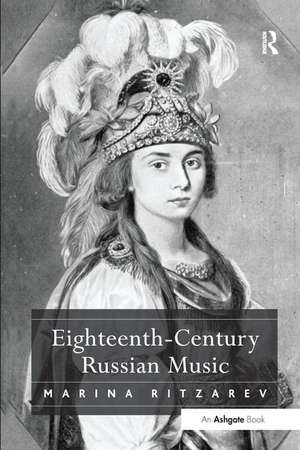Eighteenth-Century Russian Music
Autor Marina Ritzareven Limba Engleză Paperback – 26 aug 2016
| Toate formatele și edițiile | Preț | Express |
|---|---|---|
| Paperback (1) | 398.81 lei 3-5 săpt. | +25.69 lei 10-14 zile |
| Taylor & Francis – 26 aug 2016 | 398.81 lei 3-5 săpt. | +25.69 lei 10-14 zile |
| Hardback (1) | 819.90 lei 6-8 săpt. | |
| Taylor & Francis – 16 aug 2006 | 819.90 lei 6-8 săpt. |
Preț: 398.81 lei
Preț vechi: 433.49 lei
-8% Nou
Puncte Express: 598
Preț estimativ în valută:
76.31€ • 79.89$ • 63.14£
76.31€ • 79.89$ • 63.14£
Carte disponibilă
Livrare economică 15-29 martie
Livrare express 04-08 martie pentru 35.68 lei
Preluare comenzi: 021 569.72.76
Specificații
ISBN-13: 9781138249462
ISBN-10: 1138249467
Pagini: 416
Dimensiuni: 156 x 234 x 25 mm
Greutate: 0.59 kg
Ediția:1
Editura: Taylor & Francis
Colecția Routledge
Locul publicării:Oxford, United Kingdom
ISBN-10: 1138249467
Pagini: 416
Dimensiuni: 156 x 234 x 25 mm
Greutate: 0.59 kg
Ediția:1
Editura: Taylor & Francis
Colecția Routledge
Locul publicării:Oxford, United Kingdom
Cuprins
Contents: List of figures and tables; List of music examples; Preface; Acknowledgements; Notes on abbreviations and transliteration; Rethinking eighteenth century Russian music; PrePetrine legacy; Toward the new Russian idiom: between Germans and Italians; between Italians and Russians; At the court of Grand Duke Peter Fedorovich; The thaw of the 1760s; Lessons of the 1770s: Berezovsky and Bortniansky in Italy; The city in the 1770s; Bortniansky and the 1780s; The late eighteenth century Russian salon; Sarti in Russia; 1790s: muses and cannons; Master and serf; The choral concerto in the 1790s; Bortniansky in the nineteenth century; Bibliography; Index.
Notă biografică
Marina Ritzarev is the author of several books in Russian - on both eighteenth- and twentieth-century Russian music. She is a professor of music at Bar-Ilan University and president of Israel Musicological Society.
Recenzii
’Marina Ritzarev (Rytsareva) has been writing about eighteenth-century Russian music for several decades now, and this new book finally makes her labours available in comprehensive fashion to an English-language readership. The work is full of strengths, particularly in her mastery of the huge repertory and her equal and very welcome control of the complex archival holdings... The book's historiographical detours are among its strengths and surprises... The volume hits its stride in chapter 4, at mid-century, where the author begins her discussion of the crucial composer Maxim Berezovsky. This is where Ritzarev's many years in the archives pay off and her confidence, authority, and ease of communication really come to the fore. The chapters focusing on the development of the concerto in the hands of both Russian and Western composers are particularly strong... [The] brief concluding section bristles with stimulating information, suggestions, and hypotheses...’ Music and Letters '... a valuable and very interesting book... There is a wealth of information in this book...' Early Music Review ’... Ritzarev’s book it is to be welcomed as an important major work by a major scholar ... Ritzarev is familiar with the relevant sources, has worked extensively in archives and is well placed to comment on existing critical approaches from both Russian and western perspectives... The book is enhanced by a large number of black-and-white illustrations and over a hundred musical examples... Both Ritzarev and Ashgate are to be congratulated on having produced...a book that will satisfy and stimulate readers from a variety of scholarly backgrounds.’ Journal for Eighteenth-Century Studies ’... a much awaited publication that fills up a large gap in the history of music... Ritzarev is also one of the world's most knowledgeable, meticulous and yet remarkably interesting-to-read writers about Russian music in general... With the patience and pedantic conscientiousness of
Descriere
Starting from an examination of the rich legacy of Russian music up to 1700, Marina Ritzarev explores the development of music over the course of the eighteenth century. The book focuses on what is characteristic and crucial to Russian music during this period, rather than seeking to provide a comprehensive survey. The musical culture of the time is discussed against the background of social, political and cultural life and the importance of previously marginalized sectors is highlighted. New light is also cast on the well-researched topic of Russian opera
